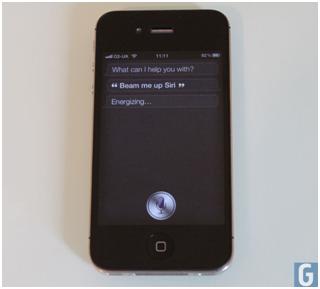Sirious Application
 The current iteration of iPhone (4S) has been awaited for a really long time. This was in part due to Apple’s delay in its unveiling, which bypassed the usual June announcement schedule that has been in place for four years or so. When it came out, the new iPhone was predictably impressive in terms of its technical aspects – faster processor, better camera, etc. However, as the name suggests 4S was only an evolutionary step away from iPhone 4. Aside from the iCloud integration, there doesn’t seem to have been any new “killer” features that redefine the way we use our phones – with one very notable exception. Siri, Apple’s new voice-controlled electronic assistant, was something that seemed to have dropped out of a SciFi movie. For many of us this was the first direct contact with artificial intelligence, and possibly the first step into the upcoming increasingly intuitive ways that we interact with technology.
The current iteration of iPhone (4S) has been awaited for a really long time. This was in part due to Apple’s delay in its unveiling, which bypassed the usual June announcement schedule that has been in place for four years or so. When it came out, the new iPhone was predictably impressive in terms of its technical aspects – faster processor, better camera, etc. However, as the name suggests 4S was only an evolutionary step away from iPhone 4. Aside from the iCloud integration, there doesn’t seem to have been any new “killer” features that redefine the way we use our phones – with one very notable exception. Siri, Apple’s new voice-controlled electronic assistant, was something that seemed to have dropped out of a SciFi movie. For many of us this was the first direct contact with artificial intelligence, and possibly the first step into the upcoming increasingly intuitive ways that we interact with technology.
Like almost everyone else, I was fascinated with Siri from the moment I started using it. It took Siri a little while to get used to my accent (and learn how to properly pronounce my name), but after a while it performed fluidly and without any major issues. It was a fun thing to use, and to this day I regularly employ it to add items to my schedule or compose a text message. However, until two days ago I didn’t think that there was a need for it other than to make the task that I already do more efficient. This Thursday I had to go to see an optometrist, and among other tests and exams I had my eyes dilated. As you may know, this seriously messes up your vision for a few hours, especially for the near objects. I was unable to see clearly, so I had to call up my wife and tell her that I’ll be late. The problem was I could not see anything on my iPhone, so any kind of dialing (even quick dialing) was out of question. Unlike the phones with a physical keyboard, there is no tactile feedback on iPhone so I could not wing it that way either. That’s where Siri’s help became invaluable: I just told my phone to call my wife at work, and that’s what she did. Pretty amazing when you think of it, and it opened my eyes (no pun intended) to the whole new world of possibilities that Siri opens up, especially for people with impaired vision. I will never think of Siri as just a handy toy any more.
There are no comments yet, add one below.
